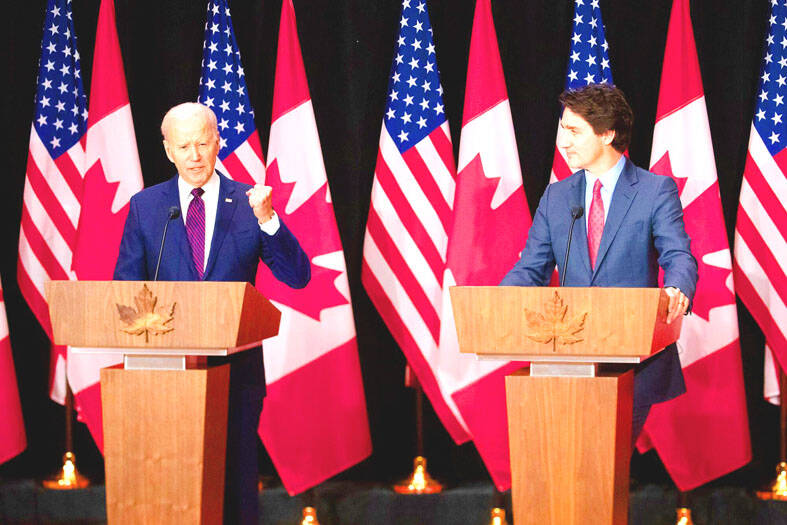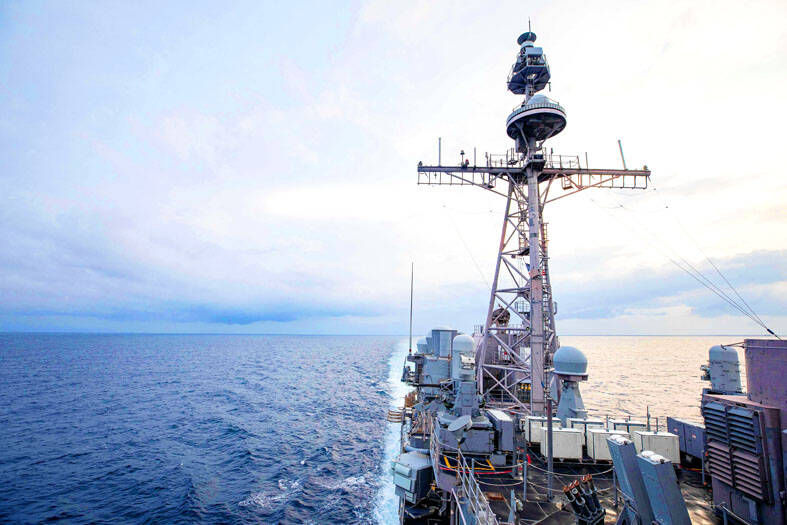US President Joe Biden and Canadian Prime Minister Justin Trudeau on Friday issued a joint statement reiterating the importance of maintaining peace and stability in the Taiwan Strait, as they encouraged Beijing and Taipei to resolve issues peacefully.
“We emphasize that our basic positions on Taiwan remain unchanged, and reiterate the importance of maintaining peace and stability across the Taiwan Strait as an indispensable element of security and prosperity in the international community,” the leaders said in a joint statement issued during Biden’s visit to Ottawa.
“We encourage the peaceful resolution of cross-strait issues,” it added.

Photo: Bloomberg
Biden and Trudeau also presented a united front against authoritarian regimes days after the leaders of China and Russia held a summit in Moscow.
The statement said that Ottawa and Washington “acknowledge the serious long-term challenge to the international order posed by the People’s Republic of China, including disruptive actions such as economic coercion, nonmarket policies and practices, and human rights abuses.”
“While we will cooperate with China in areas of mutual interest, such as on climate change, we remain committed to ensuring our ability to compete effectively with China on a level playing field,” it said. “Canada and the United States will also continue to cooperate on countering foreign interference in our societies in a manner that reflects our shared democratic values.”

Photo: AFP / Justin Stack / US Navy
The leaders also “welcomed the first US-Canada Indo-Pacific Strategic Dialogue on March 10 and will cooperate to promote a free, open, prosperous, secure and resilient Indo-Pacific,” it added.
Images of Biden and Trudeau standing side by side in Ottawa announcing agreements including on semiconductors and migration represented a counterpoint to the scene in Moscow days earlier. There, Chinese President Xi Jinping (習近平) and Russian President Vladimir Putin professed friendship and pledged closer ties as Russia struggles to make gains in what the West considers an unjust invasion of Ukraine.
At a joint news conference with Trudeau, Biden questioned the level of China’s and Russia’s cooperation, adding that China has not provided weapons to Russia for use against Ukraine.
Biden said the US had expanded alliances including with NATO, the G7, South Korea and the “Quad” nations of the US, Australia, India and Japan.
“We have significantly expanded our alliances,” Biden said. “Tell me how in fact you see a circumstance where China has made a significant commitment to Russia. What commitment can they make?”
Addressing Canada’s parliament, Biden said that as NATO members, the two countries would “defend every inch of NATO territory.”
Trudeau told the news conference that Ukraine was a top issue.
“Today we reaffirmed our steadfast support for the Ukrainian people as they defend themselves against Putin’s brutal and barbaric invasion,” Trudeau said.
At the news conference, Trudeau announced the two leaders had signed an agreement with IBM to develop semiconductor capacity and ease reliance on foreign makers after supply-chain problems bedeviled the countries.
The US Defense Production Act is to provide US$250 million, Biden said.
Canada has an abundance of the critical minerals used to produce batteries and electric vehicles, but China currently dominates the global market.
Trudeau is preparing a budget to be published on Tuesday aimed at scaling up critical mineral and clean tech production.
Biden announced US$50 million to incentivize US and Canadian companies to invest in packaging semiconductors and said that Canada would provide up to C$250 million (US$181.11 million) for semiconductor projects in the near term, the joint statement said.
The countries also agreed on an energy transformation task force focusing on clean power and vowed to cooperate on a “North American critical minerals supply chain,” it said.

DAREDEVIL: Honnold said it had always been a dream of his to climb Taipei 101, while a Netflix producer said the skyscraper was ‘a real icon of this country’ US climber Alex Honnold yesterday took on Taiwan’s tallest building, becoming the first person to scale Taipei 101 without a rope, harness or safety net. Hundreds of spectators gathered at the base of the 101-story skyscraper to watch Honnold, 40, embark on his daredevil feat, which was also broadcast live on Netflix. Dressed in a red T-shirt and yellow custom-made climbing shoes, Honnold swiftly moved up the southeast face of the glass and steel building. At one point, he stepped onto a platform midway up to wave down at fans and onlookers who were taking photos. People watching from inside

A Vietnamese migrant worker yesterday won NT$12 million (US$379,627) on a Lunar New Year scratch card in Kaohsiung as part of Taiwan Lottery Co’s (台灣彩券) “NT$12 Million Grand Fortune” (1200萬大吉利) game. The man was the first top-prize winner of the new game launched on Jan. 6 to mark the Lunar New Year. Three Vietnamese migrant workers visited a Taiwan Lottery shop on Xinyue Street in Kaohsiung’s Gangshan District (崗山), a store representative said. The player bought multiple tickets and, after winning nothing, held the final lottery ticket in one hand and rubbed the store’s statue of the Maitreya Buddha’s belly with the other,

‘NATO-PLUS’: ‘Our strategic partners in the Indo-Pacific are facing increasing aggression by the Chinese Communist Party,’ US Representative Rob Wittman said The US House of Representatives on Monday released its version of the Consolidated Appropriations Act, which includes US$1.15 billion to support security cooperation with Taiwan. The omnibus act, covering US$1.2 trillion of spending, allocates US$1 billion for the Taiwan Security Cooperation Initiative, as well as US$150 million for the replacement of defense articles and reimbursement of defense services provided to Taiwan. The fund allocations were based on the US National Defense Authorization Act for fiscal 2026 that was passed by the US Congress last month and authorized up to US$1 billion to the US Defense Security Cooperation Agency in support of the

‘COMMITTED TO DETERRENCE’: Washington would stand by its allies, but it can only help as much as countries help themselves, Raymond Greene said The US is committed to deterrence in the first island chain, but it should not bear the burden alone, as “freedom is not free,” American Institute in Taiwan Director Raymond Greene said in a speech at the Institute for National Defense and Security Research’s “Strengthening Resilience: Defense as the Engine of Development” seminar in Taipei yesterday. In the speech, titled “Investing Together and a Secure and Prosperous Future,” Greene highlighted the contributions of US President Donald Trump’s administration to Taiwan’s defense efforts, including the establishment of supply chains for drones and autonomous systems, offers of security assistance and the expansion of